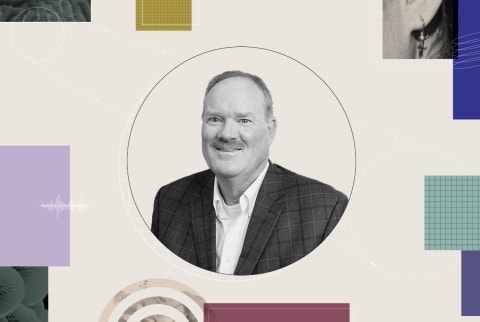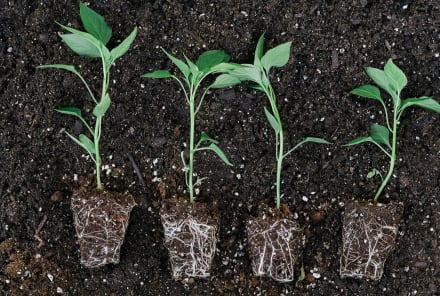Advertisement
3 Things That Can Secretly Sabotage Your Health, From The Father Of Functional Medicine


Our climate crisis is quickly becoming a health crisis; this year, we've seen just how much harm it plays in not only our planet but also our bodies. As such, doctors and health care professionals have a unique front-row seat to these damaging effects, and as we urge in our 2022 Wellness Trends, their voices can really make a difference in advocating for climate reform—in their exam rooms and beyond.
The father of functional medicine Jeff Bland, Ph.D., founder of Big Bold Health, is one of those practitioners leading the charge: "The planet has an immune system, we have immune systems, and they're intercommunicating," he says on this episode of the mindbodygreen podcast. And below, Bland explains a few ways a warming world can sneakily affect our health:
Soil health
It's something we've discussed here before: Soil health is critical for growing nutrient-rich crops—and thus, a nutrient-rich diet. But because traditional agricultural methods expose soil to a plethora of chemicals, fertilizers, pesticides, herbicides, and fungicides, the fruits and vegetables can't extract the healthy minerals and nutrients they need from the ground. And the food we end up eating isn't as nutritious as it could be if we weren't destroying that critical microbial life—and that trickles down to affect our overall health.
"We need to take this back right to the soil," declares Bland. "We need to start building up our understanding of stability where health derives itself because it's part of this network of interconnection among soil organisms to plants, plants to humans, humans, to animals, animals to the planet, and so forth."
Health care practitioners also realize this connection, Bland continues, sometimes subconsciously: When integrative-minded doctors suggest eating diverse, local, minimally processed foods, what they're really suggesting is eating in a way that stabilizes the ecosystem, and thus your own health. "New, re-found concepts built around historical principles and tied to resilience tie themselves back to how we can make our food supply as healthy as possible, as sustainable as possible, as regenerative as possible, as diverse as possible, and in harmony with the planet," he says.
Air quality
In terms of air quality, the climate-health connection is clear: Research suggests that climate change is extending the pollen allergy season1 and increasing the pollen count2 in the air. Another recent study published in the journal Scientific Reports found that substances in the atmosphere that contribute to air pollution may also affect vitamin D levels3. In short: The longer we ignore our growing emissions, the more we'll see its impacts on health care.
Says Bland, it's important to recognize this connection and do what you can to reduce your personal footprint, and, by extension, support your health. For example: "We know that transportation is very energy-intensive," Bland explains. "Whenever we're using concentrated energy in the way of petrochemical fuels, we are producing a lot of carbon dioxide in the process." There's a reason global carbon emissions dipped by 17%4 during the peak of pandemic lockdowns: "We weren't traveling on jets as much," he adds. "That's one of the things to portion out: How much do we need to get in the car and drive? How much do we need to get on planes and fly? Because they are really big energy users and produce a lot of carbon dioxide."
Negative emotions
In case you couldn't tell, Bland sees a connection between everything on this planet (we agree; hence, one word, mindbodygreen), and that includes your own emotions. "Ideas, experiences, feelings, thoughts, and attitudes we might call 'soft' can be materialized into molecules through a transduction process that's related to the interface between our nervous and immune systems," Bland says.
Now, that sounds like a pretty technical process, but stay with us here: Every interaction you have is actually filled with molecules that create real effects in your body; so if you have a disturbing conversation, for example, you would create molecules of disturbance that lay down "cracks" in your nervous system.
It's a concept rooted in science: In fact, neuroscientist and pharmacologist Candace Pert, Ph.D., called them "molecules of emotion," and they can significantly affect your physical health. "These things are more than just transient because they can influence epigenetic processes," says Bland. "They can lay down memories that actually tag our genes in such a way that they remember these experiences long after the conversation has stopped." In other words: These experiences become materialized in your body, and, if those experiences are consistently negative, they can result in negative physical outcomes.
"People think they are soft, but they're not soft," Bland adds. "They're signals that translate directly through these receptor systems [our] thoughts, attitude, beliefs—like a lack of attribution, sense of fulfillment, and a sense of loneliness—and converts them into molecules that epigenetically modify our gene expression to be in a state of trauma or to be in a state of dysfunction or lack of balance."
The takeaway.
Our environment plays an integral part in optimal health and well-being, as everything in our world is interconnected (even our ideas, thoughts, and experiences can result in physical health outcomes). After all, according to Bland, the term ecology refers to the study of homes—it's derived from the Greek words oikos (meaning "house") and logos (meaning "study"). "Our home could be what we go to at night or during the day, or maybe we think of home as planet Earth," he says. "It could be our cells and our own health, it could be that of our relationships with loved ones, or it could be the broader community—but there is a general sense now that this connectedness is true."
Enjoy this episode sponsored by sonos! And don't forget to subscribe to our podcast on iTunes, Google Podcasts, Spotify, or Amazon Music!











